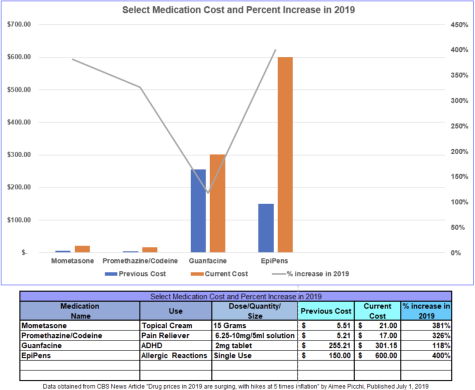Drug Prices
November 8, 2021
When it comes to the pharmaceutical industry or “big pharma,” over-the-counter and prescription drug prices have seen a significant increase under the privatized pharmaceutical market; drug prices have gone up 17% as a whole which is five times the rate of inflation rate and 41 out of the 3,400 drugs that have had a price increase have gone up more than 100%.
An example of this price increase can be found when looking at the prices of different pharmaceutical drugs increased over a year from 2018-2019.

These are all a result of the simple fact that our privatized healthcare system prioritizes profit over people. It must be understood that this is no anomaly and that this is integral to every aspect of capitalism. A capitalist mode of production (how the means of production are organized) has an inherent profit motive. This profit motive also roots itself in the market system of distribution (how goods and services are distributed and exchanged) that we have in the U.S. and under global capitalism.
This profit motive forwards capitalist industries to operate at the expense of the proletariat (working class) to increase capital (money and asset) gains. We can see this profit motive at work in various places under capitalist society when it comes to wages, arbitrary set prices and the outsourcing of jobs.
Now how does this profit motive relate to healthcare in the U.S.? Pharmaceutical drug prices have increased exponentially. However, this is not merely the result of just supply and demand factors as many might have you believe. Rather often these prices are set arbitrarily by drug manufacturers. According to GoodRX Health “Each year in January and July drug manufacturers raise the list price of their medications.”
This is in part because the U.S. government does not negotiate directly in setting drug prices, but instead, we allow drug companies to set their own prices. The costs of healthcare can be even more burdensome when taking into account that private insurers will raise the cost of their insurance in accordance with drug price raises. This creates a perpetual loop wherein the burden of cost is put squarely on the patient/consumer all because of the profit motive of capitalism.
Now how will a single payer healthcare system help fix this problem? A single payer system will give the U.S. government the power to regulate and negotiate drug prices. This will treat pharmaceutical drugs as commodities with inelastic demand — prices that do not rise due to market forces/pressures — thus making drugs way more affordable for the average person.